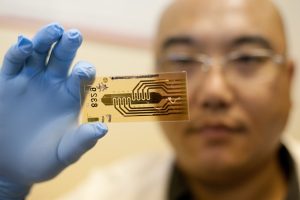As the NSF program director of Nano-Biosensing program in the Chemical, Bioengineering, Environmental and Transport Systems (CBET) Division, Dr. Chenzhong Li will be interacting with principal investigators who are doing research in the field of Biosensors and Biomedical Devices, forming and facilitating merit review panels, managing and recommending funding decisions. NSF’s engineering directorate has targeted many multidisciplinary research areas for rapid development, including advanced manufacturing technologies, information and communication technologies, and improved health care delivery. Dr Li’s expertise in biomedical engineering and analytical chemistry cuts across these areas. The Nano-Biosensing program supports fundamental and translational engineering research on biosensing devices and novel analytical methods for measurement and quantification of biological analytes.
He will also work with program directors in other NSF divisions and other federal agencies such as DPRPA, USDA, FDA and NIH to develop and manage interdisciplinary research projects. He will conduct outreach at conferences, workshops and university research sites about how NSF works, and encourage them to submit high quality research proposals.
Dr. Li says: “I am very excited about this opportunity to oversee the research in design, manufacturing, and applications of biosensors,”. He will also continue working with his graduate students and FIU colleagues, commuting back to the Miami area periodically.
Dr. Li is a professor and the director of the Nanobioengineering/Bioelectronics Lab, at Florida International University’s Department of Biomedical Engineering. Dr. Li received his M.Sc (Electrochemistry) and Ph.D (Bioengineering, 2000). Dr. Li is an expert in bioelectronics, specifically in the development of biomedical devices such as wearable/portable biosensors. Dr. Li’s research interests include Point Care of Testings, wireless diagnostics, cell electronics, neuron-device interface, biomarker and nanotoxicity measurements and electron transfer study of various biomolecules. The impact of his work is documented in 9 granted patents and about 130 peer-reviewed journal papers. He also led the development efforts as co-principal investigator of two newly funded NSF Engineering Research Centers (ERC) and NSF NRT project called Nanomedicine Academy, which translate cutting-edge advances in nanotechnology and biomedical engineering into an education model for low-resource institutions.
Dr. Li says: “To be NSF program director and be provided an opportunity to play a significant role in setting the direction for nano and biosensing related research is a deeply felt honor for me”.
Visit the NSF website for more information about the program.

